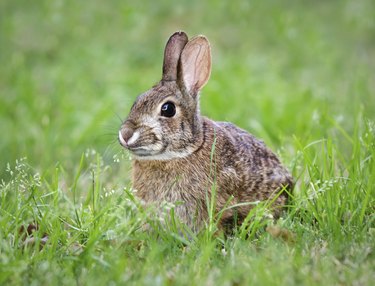
Strawberries (Fragaria x ananassa) are a widely grown fruit crop in home gardens across the country, thriving as perennials in U.S. Department of Agriculture plant hardiness zones 5 to 8, and as cool-season annuals in zones 9 and 10. Many strawberry growers find themselves dealing with damaged plants or stolen fruit over the course of the growing season, and rabbits are frequently to blame.
Identifying the Damage
Video of the Day
Rabbits often eat wild strawberries (Fragaria virginiana) as part of their regular diet, so moving on to the cultivated version is a natural step. Rabbits often nibble away the tender green shoots of strawberry plants and other garden crops as they first appear in early spring. The flowers of strawberry plants are also favored by rabbits, and these pests may strip strawberry plants of blossoms in springtime, preventing any fruit from growing. In some cases, rabbits will also eat the fruit itself, but a wide range of other pests may be responsible for fruit theft, including birds, squirrels and raccoons. Rabbits do most of their feeding at night, and may never be seen by gardeners.
Video of the Day
Weighing Your Options
If you are cultivating a large strawberry crop, rabbit control can be extremely difficult, but if you are only growing a small garden or strawberry patch, then you have a few options. Some gardeners resort to trapping, but this is an inadvisable approach for several reasons. Trapping is inefficient and often harmful to the rabbits. It also leaves the problem of what to do with rabbits once they are trapped, and many states have strict laws that control the trapping and release of animals. Several other methods offer a solution without harming the animals.
Discouraging Rabbits
Rabbits generally do not travel far from their dens, so if rabbits are damaging your strawberry plants, then they are probably holing up nearby. One of the most effective ways to reduce rabbit damage is to make the landscape less suitable for nesting. This may not be possible if you have extensive woods or wild areas near your garden, but you can reduce potential den sites in the general vicinity by cutting tall brush and weeds near your garden, controlling vegetation along ditches and hedge rows and eliminating piles of wood, brush, rocks or other debris that may offer shelter for a rabbit den.
Resorting to Repellents
A handful of natural repellents may keep rabbits from browsing your strawberry patch, but their effectiveness is by no means guaranteed. Repellents take advantage of rabbits' keen senses of taste and smell to make your plants unpalatable. Chemical repellents cannot be used on plants intended for human consumption, but natural substances like mint oil, garlic oil and red cayenne pepper may be used. Some gardeners spread used cat litter around the outside of the garden, plant onions among strawberries or sprinkle human hair around the garden to discourage rabbits. Most repellents need to be reapplied after a rain.
Building Fences and Barriers
Fences and barriers are often the most effective way to keep rabbits out. A fence constructed of 1-inch poultry wire attached to wooden posts around the outside of the garden usually does the trick, though the fence must extend 6 to 10 inches underground to keep rabbits from digging underneath. An 18- to 24-inch high fence will effectively keep cottontail rabbits out, but a 30- to 36-inch fence is needed for jackrabbits. If you're not sure which species you have in your area, a 36-inch fence will cover all your bases.
A similar option involves constructing half-cylinder-shaped row covers using wood and fine wire mesh. These covers rest over top of each row of strawberry plants, and can easily be removed any time you need to tend your garden or harvest fruit. The disadvantage of row covers is that rabbits can sometimes slip underneath, but they offer the added advantage of keeping out birds, which are also known to feast on strawberries.
- Texas A&M University: Fragaria X Ananassa
- University of Nebraska - Lincoln: Exclusionary Methods and Materials To Protect Plants From pest Mammals - A Review
- New Mexico State University: Garden Rabbit Control
- DeKalb County Cooperative Extension: Discouraging Rabbits in the Garden
- University of California Integrated Pest Management Program: Rabbits
- Iowa State University: Rabbits in the Garden
- UMass Extension: What’s Eating My Vegetables?
- The Pennsylvania State University: Eastern Cottontail Rabbit